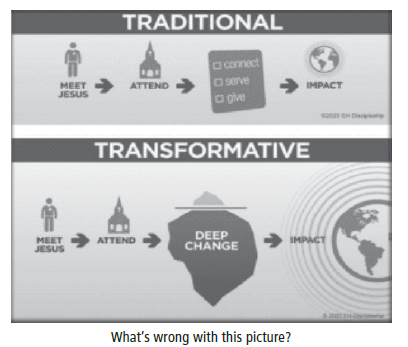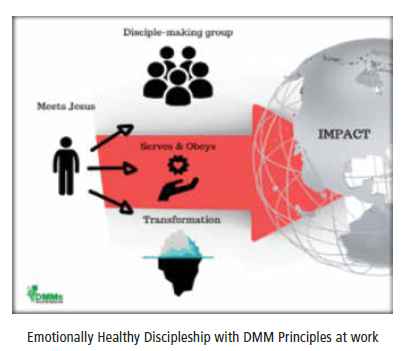How Possible Is It to Multiply Rapidly and Still Make Healthy Disciples?

Is it possible to be both deeply committed to healthy, deeply transformational discipleship, and also to the rapid multiplication of disciples? Opponents of the trend in missions toward DMMs (Disciple Making Movements) and CPMs (Church Planting Movements) often express concern about the rapid growth. Are they truly being grounded in God’s Word? Is allegiance shifting to Jesus over Mohammed or other religious philosophies?
It doesn’t hurt to listen to our well-intentioned critics (Ps. 15:31). Some who criticize do so out of ignorance of what DMMs/CPMs are trying to do. Others have had personal negative experiences that cause them to raise eyebrows. There are those, however, who truly want to see God’s kingdom grow on this earth. Some of our critics raise valid points.
The issue of deep-level life transformation as it relates to disciple-making is something we must be concerned about. It’s something movements should regularly evaluate as they grow. We do not want shallow, superficial movements easily hijacked by false doctrine. Unless movements go both broad and deep, they will not be sustainable. Nor will they bring about the transformational kingdom impact we hope for.
Let’s explore the issue of transformational discipleship further. The question this article will address is whether or not it is possible to see both the rapid multiplication of disciples and churches, while also seeing the deep- level transformation of lives. We will attempt to answer the questions: Can disciples multiply quickly, but also be solidly grounded in the Word of God, its core doctrinesand deeply shaped by the life and ways of Jesus? Can we rapidly multiply emotionally and spiritually healthy disciples through movement strategies?
In this kind of magazine, I assume I am writing to those who are already on board with the idea of DMMs/CPMs. I won’t take time to explain here why DMMs and CPMs are necessary to fulfill the Great Commission. Let’s begin from that starting point. If you aren’t there in your thinking, please take a look at the Why DMMs? article on the Dmmsfrontiermissions.com website.
If rapid multiplication rather than addition growth is necessary to address the issue of lostness, particularly among the unreached, how can we be sure we do it in such a way that we see genuine transformation of lives as people encounter Christ?
It is possible to be committed to both transformation and rapid growth. How do I know this? Because Jesus was. His movement and ministry are our models for all we do. He showed us how to make and multiply disciples rapidly and in healthy, sustainable ways.
Four Failures in Disciple-Making
Peter Scazzero has had a significant impact on my life. If you’ve never read his books, I recommend them. Shortly after going through a season of marital conflict and depression, I came across Emotionally Healthy Spirituality. Many of the lessons he referred to in the book mirrored my learning during that season.
Later, I read Emotionally Healthy Church, and Emotionally Healthy Leader. I am in the middle of reading Emotionally Healthy Discipleship, Scazzero’s newest book. He doesn’t directly attack DMMs or CPMs, I’m not even sure he is familiar with them. As I was reading, though, my mind was filtering his content through my disciple-making grid. I want to draw from some of what he said in the early chapters of this book.
In chapter one of Emotionally Healthy Discipleship, Scazzero writes about four key failures in discipleship.
1. We tolerate emotional immaturity.
2. We emphasize doing for God over being with God.
3. We ignore the treasures of church history.
4. We define success wrongly.
These four failures are worth considering as we pursue rapid multiplication. Let’s consider them together.
Tolerating Emotional Immaturity
Do we tolerate emotional immaturity, or do we address it in our disciple-making and leadership training in movements? What does the word emotional immaturity mean?
Scazzero describes emotional maturity as loving others well. Those who are emotionally mature can have healthy conflicts, talk through misunderstandings and disagreements in godly ways and reflect Jesus in their behavior toward others. Those closest to them and those they lead (including their families), feel valued and cared for. Emotionally healthy disciples are not “triggered” easily. Past woundings have been healed and worked through.
Let’s admit that in DMMs and CPMs sometimes we are so desperate to find the extremely fruitful movement apostle, we tolerate things in their lives we wouldn’t in others. When we find someone who is a “super-sower,” starting many new groups, we at times overlook how they treat their wife or husband or their lack of relationship with their children.
This is a danger. What should we do about it? Keep reading. But first, let’s look at Scazzero’s other points.
Doing Over Being
Movement leaders and catalysts are do-ers. Again, let's just admit that. It’s a strength. It can also be a weakness. Unless we live a life of deep abiding with Jesus, we will not be able to reproduce an abiding lifestyle in those we train, lead and coach. Obedience-based discipleship asks the question: what will you do to obey? This is vitally important, and part of what drives movements forward. Jesus said if we love Him, we would obey His commands (John 14:15). He spoke of wise and foolish builders and said that the person who fails to put His word into practice is like the man who built on sand (Matt. 7:24- 27). This is well established. We recognize it as a major weakness in legacy, or traditional, church practice.
We must be careful not to swing too far in the other direction. Avoid multiplying “Martha” disciples who do a lot, but don’t sit at Jesus’ feet. Model and encourage disciples to love Jesus, worship Him and be changed by His love. How can we be more intentional about modeling being as well as doing in our disciple-making?
Ignoring History
Again, it is worth considering this potential discipleship failure. There is much to be learned from the history of Christianity. Some traditions were developed for valid reasons in particular contexts and may be worth retaining. Others have impeded the growth of disciple- making and evangelism through ordinary believers. We don’t need to “throw out the baby with the bathwater,” to use an American idiom. We need to be discerning, running things through the reproducibility test. If church traditions are hindering the multiplication of disciples, they should be carefully reconsidered.
Scazerro is referring not only to church history, however. He is also speaking of our personal histories. Healthy disciple- making helps people find healing from their past. As Scriptures about forgiveness are studied, wounds from parents, siblings, enemies and oppressors need to be worked through.
How We Define Success
Once more, let us examine ourselve with raw honesty. There are times when we (DMM/CPM practitioners and trainers) define success by something extra-biblical. The commonly held definition of what is a movement (see my blog article What is a DMM?) is not directly from Scripture, nor did Jesus ever tell us to make it a landmark of great accomplishment to hit fourth-generation, multi- stream growth.
Yet, when we finally get to that fourth generation, wow... we’ve accomplished something! Most movement trainers and coaches would not say they define success in strictly numeric ways. I wouldn’t. Of course not. But it is something we need to be careful about. What does it communicate when you are always measuring according to having hit the fourth generation or not?
Some years ago, we had a speaker come and talk to us about tracking in our organization’s annual gathering. He emphasized the gathering of stories, not only the reporting of numbers. The kinds of stories we report say a lot about what we value.
I hope you have been tracking with me and can see that DMM/CPM strategies could potentially lead to emotionally and spiritually immature discipleship. It doesn’t need to be that way, however. Not if we are aware of this, honest about it, and continually evaluating our fruit. Good farmers don’t just aim for fruit, they want healthy fruit. If the orchard’s apples are full of bugs, that’s a problem, even if there are thousands and thousands of apples falling to the ground.
5 Healthy Discipleship Keys
Here are some areas to keep in mind as we apply DMM/ CPM principles in our ministry. They are at the core of appropriately using the DMM/CPM practices. Without them, multiplicative efforts may not lead to healthy, sustained fruit.
Make disciples, not converts.
Many leading DMM/CPM trainers have emphasized this. It should be part of our mantra as disciple-makers. At the same time, our old tendencies can rise to the surface in the rush of a ripe harvest of souls. Simply getting people baptized is not enough. Train them to obey, Jesus said. This is much more than someone getting wet! It takes time, love and investment to make disciples. It can happen rapidly, but it’s a process, not an event.
Focus on people, not meetings.
We need to disciple people, not just multiply meetings. I say this continually when I train. “Disciple-making is not a meeting.” You may have 13 disciple-making groups or Discovery Bible studies happening each week. Without genuine loving relationships and community in those groups, life transformation will not happen.
Disciple Making Movement practitioners must learn to be multi-relational, while still going deep with a few. How did Jesus do this? He had an inner circle of people He invested heavily in. He ate with them, walked with them and took them with Him everywhere. It was far more than a weekly one-hour Bible study. It was those men through whom He multiplied Himself. Jesus both went broad and deep. So must we.
Track growth, but never prioritize it over abiding in Jesus.
Scazerro says in the section of his book on wrongly defining success, “I’m not saying that it’s inherently wrong that we measure our progress by the numbers. The problem comes when numbers are the only thing we measure, and so become our ultimate marker of success... All numerical markers—increased attendance, bigger and better programs, a larger budget—must take a backseat to listening to Jesus. Jesus calls us to abide and abound in Him (John 15:1–8).” A big amen to this!
I am an advocate for carefully tracking growth. Why? Because it’s part of good stewardship.
If, however, we begin to focus more on our numbers than on abiding in Jesus, we’re in trouble! If we start to define our success by whether or not we’ve reached fourth- generation growth, red flags should be waving.
Hold both the urgency of the lost and the transformation of the saved as values.
Steve Smith highlighted this when he wrote about following Jesus and fishing for men—the twin callings (T4T book). They go together. Both matter.
Jesus loved the lost. He was deeply concerned about reaching them. It is not God’s will that any perish (2 Pet. 3:9). The gospel has not spread rapidly because we have not been as concerned about the lost as Jesus is. We’ve failed to adequately fulfill His command to go and make disciples who obey. If we don’t embrace changes, a more multiplicative model, millions and millions will continue to go into eternity having never had a chance to hear of the Savior’s love and desire to save. This is not acceptable.
Nor is it acceptable to be so focused on our inner life that we delay obedience to Christ’s command to make disciples. Abiding in Jesus, practicing solitude, silence, lives of prayer and sharing our testimony with neighbors, friends and relatives are equally part of obeying Him.

This graphic from Scazzero’s book caught my attention. It seems to say we must have deep change before we can have an impact. This was not the way Jesus discipled. Deep change and transformation happened simultaneously.
Instead, as we look at how Jesus made disciples, we learn that they immediately served and obeyed. He sent them out in Luke 9 and 10. Life transformation was an ongoing process.

I’ve consistently seen that those who pass on whatever I’ve been teaching them to others mature more rapidly. They immediately begin to have an impact on their oikos, even before they are mature or have been fully transformed. It would be a mistake to think we have to wait until we have all our issues worked through before we can begin to impact the world.
Keep Scripture central.
I have a lot of hope for DMMs and CPMs because the Word of God is foundational to every DMM/CPM practice. In multiplicative disciple-making, those discipled through
a participatory, obedience-based study of Scripture have a stronger foundational understanding of Scripture than the average church adherent. With Sunday Schools and Wednesday night gatherings becoming a thing of the past, grounding church attendees in the Word of God is rapidly slipping away. DMM/CPM praxis gets people into the word in community. It forces the issue of application to our own lives. Scripture is orally repeated and then immediately shared with others. This is a huge strength in the goal of reproducing healthy disciples who make healthy disciples.
New believers may not immediately be protected from false doctrine any more than a new believer in a traditional church would be. Over time though, within a few years, their understanding of God’s word will grow far stronger than the average Christian’s.
In conclusion, let me point us back to our Lord. He made disciples, who had some major issues. But they grew and were transformed into men and women who turned the world upside down (Acts 17:6). Within a short amount of time, they multiplied and spread His message across Asia. Thousands became His disciples through them and those they discipled in His ways. It is possible to rapidly multiply healthy disciples...more than possible. It’s happening in movements across the globe. And it will happen more!








comments